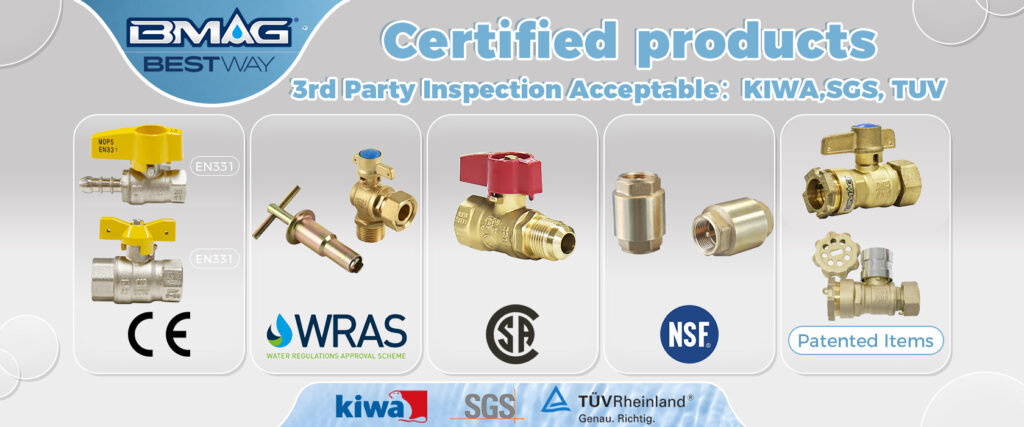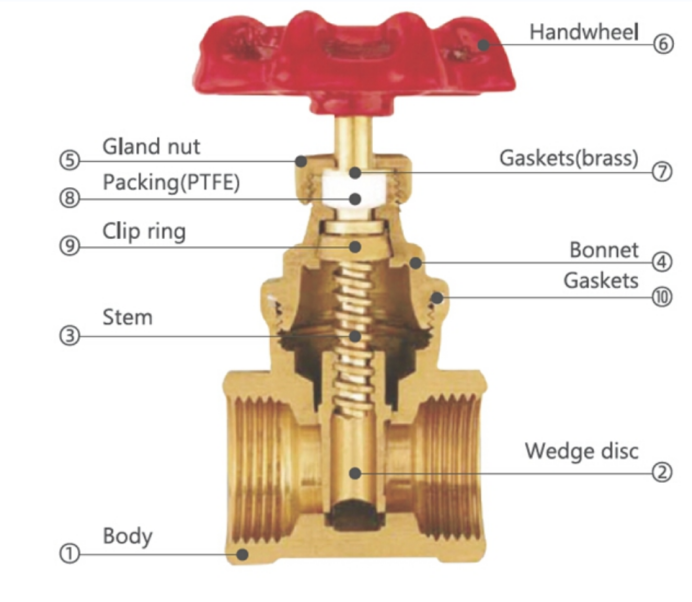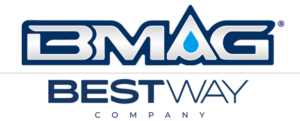Jadual Kandungan
TogolWhat are valves?
Valves are alloy of copper and zinc and other elements, They are commonly in buildings and used in plumbing and industrial applications due to their corrosion resistance, ketahanan, and convenient to machining. Brass valves come in various types, Here’s a comprehensive guide to the gate valve , ball valve , check valve , stop valve of household valves and standard.

Gate valves
- Description:
Gate valves are popular essential components in plumbing and fluid control systems, involve the wedge that moves perpendicular to the flow of the fluid. So when the gate is lowered, it allows fluid to pass through, And when raised, it obstructs the flow.
- Advantage
1.Could control the full flow,provide a straight-through, unobstructed flow path when fully open, minimizing pressure drop across the valve.
2.Demonstrate excellent sealing performance,gate valves provide a tight seal, preventing leakage of fluids through the valve.
3.Providing durability and resistance to corrosion and wear,Because are typically robustly constructed from materials such as stainless steel, brass.
- Technical standard
bahan:C89833,C46500,DZR,CW617N,CW614N,Hpb59-1,etc
Normal Pressure:16Mpas,2.0Mpas,2.5Mpa
Saiz:DN15-DN100(1/2”-4”inch)
Working Medium:Water,Non-causticity liquid,Saturated steam(≤0.6Mpa)
Working Temperature:-20℃≤t≤150℃
Standard:BS5154,EN12288,ASME16.22

Ball valves
- Description:
Ball valves are a type of quarter-turn valve that control flow through use a hollow, perforated, and pivoting ball .They offer quick, quarter-turn operation and are commonly used in applications where tight shut-off is required,And lockable ball valve also popular used now .
- Advantage
1.Ball valves control flow Directional, in various piping systems offering flexibility .
2.Tight seal highly: the ball valve use a tight seal that preventing leakage and ensuring efficient flow control.
3.Could operate quickly, By the 90-degree turn of the handle and then opened and closed, making them ideal for applications requiring fast response times.
- Technical standard
bahan:C89833,C46500,DZR,CW617N,CW614N,Hpb59-1,etc
Normal Pressure:16Mpas,2.0Mpas,2.5Mpa
Saiz:DN8-DN100(1/4”-4”inch)
Working Medium:Water,Non-causticity liquid,Saturated steam(≤0.6Mpa)
Working Temperature:-20℃≤t≤120℃
Standard:BS5351,EN13828-2003,ISO 17292.EN331-2015 (For gas)

Check valves
- Description:
Check valves preventing backflow that only allow flow in one direction, They are often used to protect pumps and other equipment from reverse flow.
- Advantage
1.Could help protect pumps, compressors, and other equipment from damage that could occur due to backflow.
2.Check valve primary function help to prevent backflow of fluids, gases, or slurries.
3.Check valves operate passively based on fluid pressure that because have a relatively simple design.
- Technical standard
bahan:C89833,C46500,DZR,CW617N,CW614N,Hpb59-1,etc
Normal Pressure:16Mpas,2.0Mpas,2.5Mpa
Saiz:DN15-DN100(1/2”-4”inch)
Working Medium:Water,Non-causticity liquid,Saturated steam(≤0.6Mpa)
Working Temperature:-20℃≤t≤120℃
Standard:ASME B16.24,ISO 228-1,EN3828-2003

Stop valve
- Description:
Stop valve also called a shut-off valve or isolation valve, used to control the flow of fluid (typically liquid) through a pipeline. Don’t like the check valves, which allow flow in one direction only, stop valves can completely stop the flow of fluid when closed,used in a wide range of industries and applications, including plumbing, HVAC (Heating, Ventilation, and Air Conditioning) systems, water treatment plants, oil and gas pipelines,play a crucial role in fluid control and management.
- Advantage
1.Have a mechanism that fully opened or fully closed. When fully open, the valve permits unrestricted flow of fluid through the pipeline. When fully closed, the valve completely shuts off the flow.
2.Can by turning a handle or wheel operated manually or can be actuated using external mechanisms such as electric, pneumatic, or hydraulic actuators. Most commonly used in residential and small-scale applications.
3.When closed, stop valves provide a tight seal to prevent leakage of fluid through the pipeline. This is important for maintaining system integrity, preventing waste, and minimizing the risk of environmental contamination.
4.With various designs, Has own advantages suitable for specific applications based on factors such as pressure, temperature, flow rate, and fluid type.
5.Require periodic maintenance, such as lubrication or replacement of seals and gaskets, to ensure proper operation and prevent leakage. Some valves are designed for easy disassembly and repair, while others may need to be replaced entirely if they become faulty.
- Technical standard
bahan:C89833,CW617N,CW614N,Hpb59-1,Hpb57-3 etc
Normal Pressure:16Mpas,2.0Mpas,2.5Mpa
Saiz:DN15-DN100(1/2”-4”inch)
Working Medium:Water,Non-causticity liquid,Saturated steam(≤0.6Mpa)
Working Temperature:-20℃≤t≤120℃
Standard:ASTM B62,EN1213-2000,AWWA C800,BS 5154

Kesimpulan
Brass Valves are mechanical devices used to control the flow of fluids (liquids, gases, or slurries) within a system by opening, closing, or partially obstructing passageways. They come in various shapes, sizes, and types to suit different applications. Some common types of valves.







